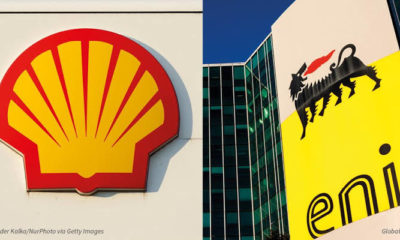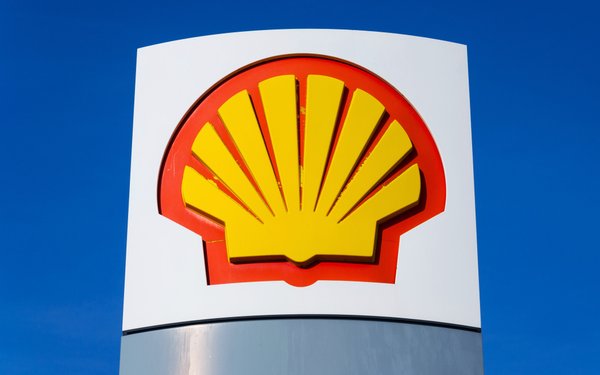Oil
Large part of Eni’s Nigerian oil deal cash went on bribes-Italian prosecutors

Italian prosecutors investigating state-backed firm Eni SpA over the purchase of a Nigerian oil field three years ago, allege that at least half of the $1.1 billion paid was used to bribe local politicians, intermediaries and others, according to official documents and a person close to the investigation.
The Milan prosecutors have placed the Italian oil company, its former chief executive Paolo Scaroni and current CEO Claudio Descalzi under investigation for alleged international corruption surrounding the deal for the OPL 245 offshore oil field concession.
Eni and both managers, neither of whom have been charged, have denied any wrongdoing.
Calling on their UK counterpart to assist in freezing suspect assets, Italian prosecutors said in a letter to the UK’s Crown Prosecution Service (CPS) seen by Reuters that at least $533 million was paid to Nigerian officials and intermediaries who helped secure the sale.
The case has been a setback for the government of Prime Minister Matteo Renzi, because Italy’s 39-year-old leader hand-picked company veteran Descalzi to run Eni as part of a recent management overhaul at the country’s state-controlled companies. Renzi has publicly supported Descalzi and said no conclusions should be drawn before the investigation is completed.
Eni and Royal Dutch Shell, which is not under investigation, bought the rights to the OPL 245 offshore oil licence block from the Nigerian government in 2011.
Production from the deepwater oil field is expected to begin in 2016 with the field estimated to hold up to 9.23 billion barrels of crude, equivalent to nearly a quarter of the country’s total proven reserves, according to industry figures.
An aide to Renzi told Reuters the case involving Eni, which is Italy’s biggest company by market capitalisation and the state’s biggest asset, was “not a big cause for concern at the moment.”
As part of their investigation, the Italian prosecutors in May asked the UK’s CPS to freeze $85 million in assets related to a Nigerian company, Malabu Oil & Gas, that prosecutors say was involved in the sale, according to a copy of the official request sent by the Milan investigators and seen by Reuters.
In the letter, the Italian prosecutors alleged that Scaroni and Descalzi oversaw the payments to parties who helped secure the sale. In a second letter they alleged that some of the ultimate recipients of alleged bribes used the money to buy aircraft and armoured cars.
“We are investigating many money transfers to many people in various countries who received sums that vary from millions of dollars to thousands of dollars,” the prosecutors said in the follow-up letter, seen by Reuters.
In response to the requests London’s Southwark Crown Court last month granted an order to seize the $85 million in assets related to Malabu, according to a judicial source.
London’s Metropolitan Police has also been investigating aspects of the Nigerian deal since last year. A police spokesman said the inquiry into allegations of money laundering is continuing.
Descalzi and Scaroni, in statements and through their lawyers, denied that they were involved in any illegal behaviour. Descalzi also told Eni employees in an email seen by Reuters that he had not engaged in any wrongdoing.
After a board meeting last week Eni also reiterated that the company had not engaged in any wrongdoing and that it had “full confidence that Descalzi had acted properly.”
The OPL 245 block licence has long been the subject of dispute. It was first awarded a decade ago by military dictator Sani Abacha to Malabu Oil & Gas for a publicly-stated $20 million.
After the death of Abacha, a new Nigerian government annulled the deal. Malabu’s licence was reinstated in 2006.
Reuters was not able to locate Malabu for comment, and it is unclear whether the company still exists.
Nigeria’s Economic and Financial Crimes Commission, a government agency, did not reply to questions sent by Reuters asking about the investigation by Italian prosecutors.
Shell, which is not under investigation in any case, released a statement saying: “Shell companies have acted at all times in accordance with both Nigerian law and the terms of the OPL 245 resolution agreement with [Nigeria].”
BUSINESSDAY-
Oil
NNPC Discovers Over 4,800 Illegal Pipeline Connections

The Nigerian National Petroleum Company (NNPC) Limited has revealed the detection of more than 4,800 unauthorized connections on oil pipelines within the country, painting a troubling image of the nation’s primary source of revenue.
Mele Kyari, the Group Chief Executive Officer of NNPC Ltd, communicated this information to the Senate Committee on Appropriations last Friday.
He said, “We have over 4,800 illegal connections on our pipelines. That means in some lines, within 100 kilometres of pipelines, you have as much as 300 insertions.
“Therefore, even when you produce the oil, you cannot deliver them at the required pressure and therefore the volume will also be less.”
As per the NNPC Ltd chief, individuals from various regions enter the Niger Delta, inserting unauthorized connections on pipelines in Nigeria’s oil-producing area.
This recent revelation follows a prior discovery of 295 illegal connections to the pipelines by the firm a year ago, underscoring the escalating issue of crude oil theft in Nigeria.
Two years earlier, Kyari had highlighted the country’s daily loss of 200,000 barrels of oil, amounting to $13 million due to theft and vandalism.
He further stated “We have two sets of losses, one coming from our products and the other coming from crude oil. In terms of crude losses, it is still going on. On the average, we are losing 200,000 barrels of crude every day.”
After the discovery, Nigeria’s security forces pledged to enhance security around the country’s pipelines.
To bolster this, the Federal Government granted a multi-billion naira pipelines surveillance contract to Tantita Security Services, headed by former militant leader Government Ekpemepulo, also known as Tompolo.
Despite facing criticism for this decision, Senator Heineken Lokpobiri, the Minister of State for Petroleum, remains convinced that it was the appropriate course of action.
In August, following a tour of oil facilities in the Niger Delta, Senator Heineken Lokpobiri expressed gratitude to Tantita, commissioned by NNPC Ltd, for their ongoing work.
He also hinted at plans for further extensive endeavors in the future.
In 2021, after extensive debate and delays, the Petroleum Industry Bill was finally passed to attract increased foreign investment into the oil sector through amendments to regulations, royalties, and taxes.
Oil
Dangote Refinery Set To Begin Fuel Production With First Crude Arrival

Nigeria’s colossal $19 billion Dangote Refinery, after encountering several setbacks, is on the verge of kickstarting fuel production.
This achievement is heralded by the arrival of the first crude shipment, transported by the OTIS tanker carrying 950,000 barrels of Nigeria’s Agbami crude.
S&P Global, citing industry sources and tanker tracking data on spglobal.com, reported the tanker’s departure on December 6, en route to Lekki, the nearest land port to Dangote’s offshore crude receiving terminal.
Scheduled to reach its destination around 8 PM on December 7, the arrival of this shipment signifies the commencement of crude supplies for the refinery’s operations.
Chartered by the state-owned Nigerian National Petroleum Company (NNPC), the Suezmax tanker is an emblem of the initial crude supply to Dangote’s cutting-edge refinery, as disclosed by a West African oil trader familiar with the matter in the S&P report.
Even though the refinery was officially completed in May, the absence of domestic crude feedstock had hindered oil product manufacturing.
To address this, the NNPC, holding a 20% stake in the refinery, struck an agreement to provide 6 million barrels of crude oil as feedstock to the Dangote refinery in December.
This move aims to jumpstart operations and overcome the previous impediments.
Agbami, operated by Chevron, holds a prominent position among Nigeria’s major deepwater developments, producing around 100,000 barrels per day in the central Niger Delta.
Known for its light sweet crude qualities, with a specific gravity of 47.9 API and a low sulfur content of 0.04%, Agbami produces substantial amounts of naphtha and kerosene.
NNPC has chartered additional shipments from different Nigerian offshore fields to the refinery, marking the start of a sequence of planned crude supplies for the month, as mentioned by the oil trader.
Located on the outskirts of Lagos, Nigeria’s commercial hub, the Dangote Refinery encountered repeated delays since its 2013 announcement, despite significant installation progress in 2019.
The refinery, designed to handle multiple crudes simultaneously, targets three Nigerian crude grades—Escravos, Bonny Light, and Forcados. When operating at full capacity, it aims to produce 327,000 barrels per day (b/d) of gasoline, 244,000 b/d of gasoil/diesel, 56,000 b/d of jet fuel/kerosene, and 290,000 metric tons per year of propane/LPG.
Dangote’s operations starting signify Nigeria’s hopes to lessen its reliance on gasoline imports, addressing the deficiencies of its existing refineries undergoing repairs. This shift is poised to reshape Nigeria’s oil industry, potentially leading to gasoline self-sufficiency by the 2040s.
Dangote officials anticipate an initial output of 370,000 barrels per day (b/d), emphasizing jet fuel and diesel production.
Industry analysts, however, project the refinery to reach its full operational capacity by mid-2025, although potential delays remain a looming concern.
Oil
NNPCL Sets Dec 2024 Terminal Date For Fuel Importation

The Nigerian National Petroleum Company Limited (NNPCL) has announced intentions to cease importing refined petroleum products by December 2024, anticipating full operational functionality for all national refineries by that time.
Group CEO, NNPC Ltd, Mele Kyari, shared this at a meeting with Speaker Tajudeen Abbas of the House of Representatives, who advocated for the privatisation of Nigeria’s refineries on Thursday.
Projections indicated the national oil firm’s revenue could climb to N4.5 trillion by the conclusion of 2023. Moreover, the rehabilitation of the Port Harcourt Refining Company, managed by NNPCL, was slated for completion by December of the current year.
Meanwhile, Oil marketers verified on Thursday that the Port Harcourt refinery is set for operations, potentially starting in January 2024. They emphasized that once operational, this refinery could notably reduce the prices of refined petroleum products.
During the meeting in Abuja, Kyari asserted Nigeria’s intention to cease importing refined petroleum products by 2024, envisioning the country’s emergence as a net exporter of these commodities within the same year.
He outlined the plans for launching operations at the Port Harcourt, Warri, and Kaduna refineries.
Kyari reiterated that all refineries would operate at full capacity, ultimately paving the way for Nigeria to transition into a net exporter of petroleum products by the conclusion of 2024.
He attributed the inactivity of Nigeria’s refineries over the years to the petroleum subsidy, emphasizing that the removal of this subsidy was drawing significant private-sector investments into the sector.
Kyari said “I can confirm to you that by the end of December this year, we will start the Port Harcourt refinery; early in the first quarter of 2024, we will start the Warri refinery and by the end of 2024, Kaduna refinery will come into operation.
“This is the commitment we are giving today and you can hold us accountable for this. In 2024, many of the initiatives including the rehabilitation of our refineries and also the efforts of small-scale refineries, and the upcoming Dangote refinery, will make Nigeria a net exporter of petroleum products in 2024.
“We will no longer be talking about fuel importation by the end of 2024. I am very optimistic that this will crystallise.
Kyari promised that by the conclusion of 2023, the government’s anticipated revenue from the company would reach N4.5 trillion, emphasizing NNPCL’s adherence to the Petroleum Industry Act and its commitment to delivering value to shareholders.
Recall that in October 2023, it was reported that Nigeria’s monthly spending on the importation of Premium Motor Spirit, known as petrol, had reached approximately N843 billion due to NNPCL’s cessation of oil swaps.
In July of this year, the Nigerian Midstream and Downstream Petroleum Regulatory Authority reported that during the post-deregulation period, spanning June 1 to June 28, 2023, the country’s total petrol consumption amounted to 1.36 billion litres, with an average daily consumption of 48.43 million litres.
The average ex-depot price of petrol, sourced solely from NNPCL as the importer, stands at about N580 per litre.
However, both NNPCL and oil marketers declared on Thursday that this substantial oil import expenditure would soon diminish.
They anticipated a drop once the Port Harcourt refinery commences production of refined petroleum products from January 2024, barring any unforeseen circumstances.

















